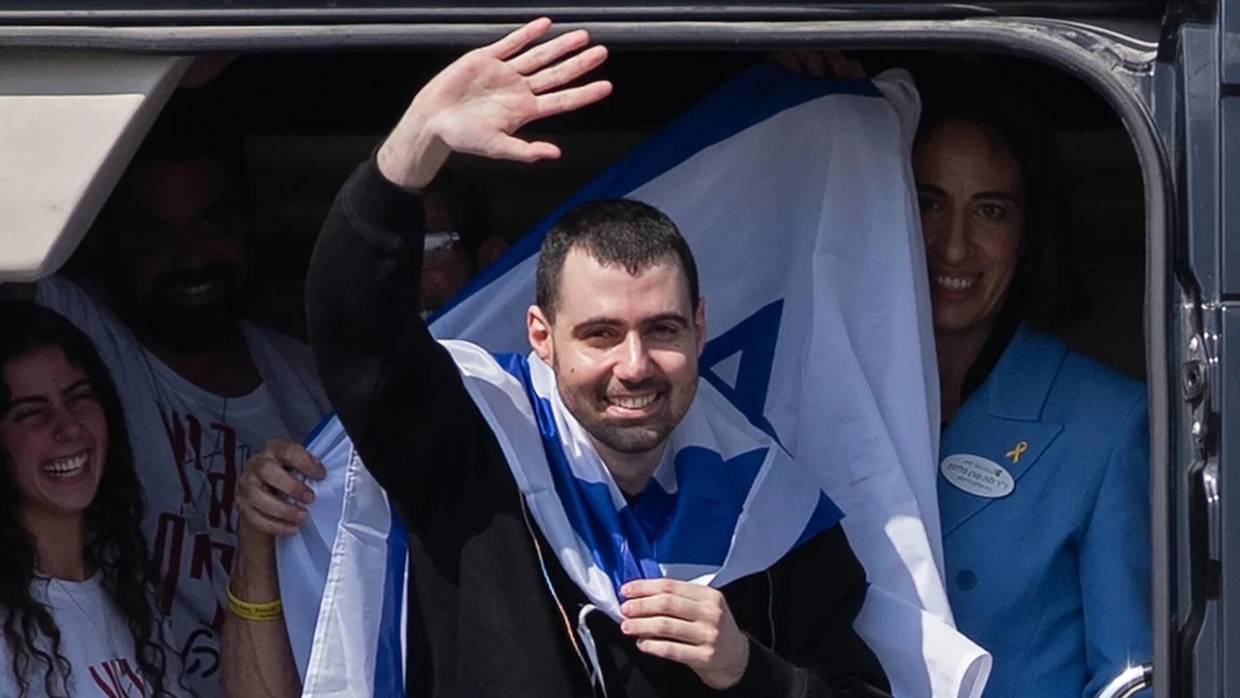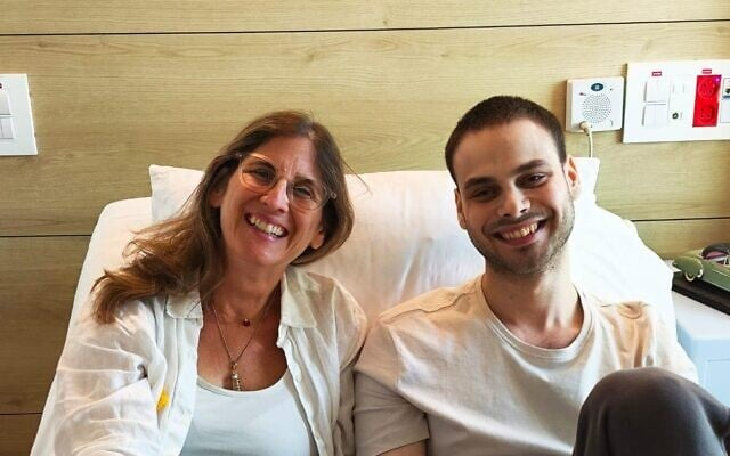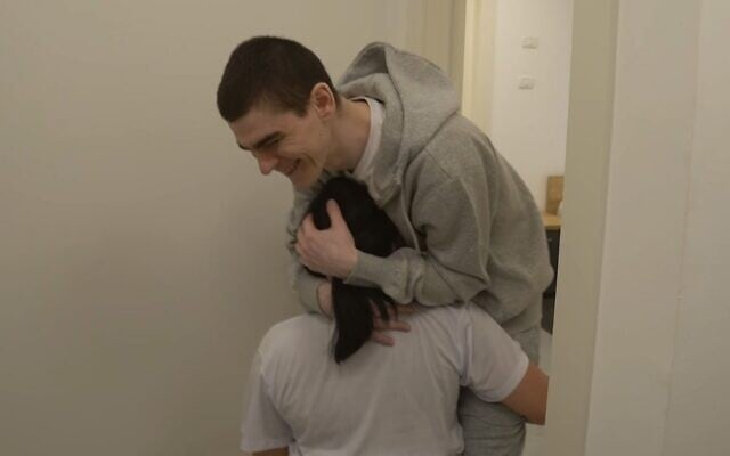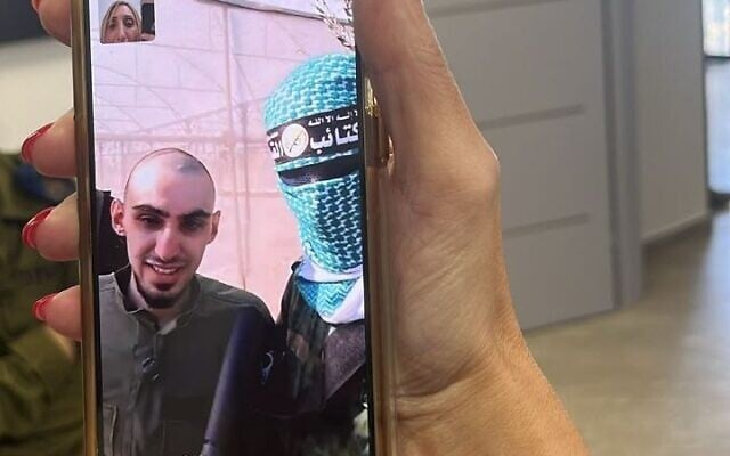 As a Jew, The Meaning of “America First”
As a Jew, The Meaning of “America First”


12 min read
3 min read
12 min read
14 min read
22 min read
After 736 days in captivity, the last 20 Israeli hostages are home—frail, scarred, but free. These are their stories of survival, loss, and return.
For two long years the entire Jewish people prayed for them. We demonstrated for them, lit extra Shabbat candles for them, reminded others of their plight, wore hostage pins, yellow ribbons, and counted the long days of their captivity. At long last, the 20 remaining living hostages were freed by Hamas on Monday, October 13.
Here are portraits of these final prisoners we’ve prayed for over 736 terrible days.
Avinatan Or, 32, grew up with six brothers in the town of Shilo and studied electrical engineering at Bar-Ilan University. Before his kidnapping he lived in Tel Aviv, worked for Nvidia, and was seriously dating his girlfriend, Noa Argamani. On October 7, he and Noa attended the Nova music festival together.
When Hamas terrorists overran the festival, Avinatan and Noa hid in a ditch for hours. After massacring hundreds of festival-goers, terrorists found them and filmed themselves abducting the terrified couple. Footage of Noa being carried into Gaza on the back of a motorcycle, her arms outstretched toward Avinatan, became one of the iconic images of that terrible day.
Israeli soldiers rescued Noa and three other hostages on June 8, 2024—245 days after their kidnapping. She and other released hostages described seeing Avinatan in captivity, held in a dungeon and denied food and water. When Avinatan was released—wearing a military-style “uniform” forced on him by Hamas—he appeared emaciated.
Brothers Ariel and David Cunio grew up in Nir Oz, where they still lived as adults. Their parents and grandparents were born in Argentina and moved to Israel forty years ago to fulfill their dreams of living in the Jewish state. (On October 7, 2023, Ariel’s and David’s great-great-grandmother Esther gained fame by averting her own kidnapping by bonding with her Hamas captors over Argentinian soccer.)
David Cunio, 33, is an acclaimed actor. On October 7 he huddled in his family’s safe room with his wife Sharon and their twin daughters (now four years old) Julie and Emma, and with Sharon’s sister and niece. For hours, David fortified the safe room door with his own body as Hamas terrorists roamed through Nir Oz, killing 47 of the town’s civilians and destroying nearly every building.
Eventually, Hamas terrorists set the Cunios’ home on fire. David and his daughter Julie escaped first through a window and were immediately captured. Terrorists dragged the other family members out through a window. David, Sharon, and Julie were brought as captives into Gaza together; two-year-old Emma was kidnapped separately. Sharon, Julie, and Emma were freed in a truce six weeks later; for the past two years, the family has waited for David. The only news they received in that time was that David was being held underground. Sharon reports that Julie and Emma are traumatized and have been longing to see their dad.
Ariel, 28, is a computer scientist. He lived in Nir Oz with his partner Arbel Yehoud, who recalled that before Hamas’ attack, the small town of Nir Oz felt like “our private paradise.” Ariel had just returned from a trip to South America, where his extended family is from. He and Arbel had just adopted a puppy. Before they were taken hostage on October 7, Ariel texted his three older brothers that he felt like he was in a “horror movie.”
Born in Argentina, Eitan (“Eitu”) Horn, 39, made aliyah at age 16 and devoted his life to helping other people navigate the transition to living in Israel. “One of the most notable things about him was his happiness,” notes Leila Banchik, who moved from Argentina to Israel and was helped by Eitan. “A cheerful man who was always making jokes, bringing laughs, and spreading good vibes.”
After Russia’s invasion of Ukraine, Eitan immediately volunteered to work with Ukrainian children who were being airlifted to Israel. “We told him, ‘But you don’t know the language!’” recalled Dalia Cusnir-Horn, Eitan’s sister-in-law, “and he said, ‘These children are scared and coming here for safety. This is what the nation of Israel was founded on, and I will be that safe place for them.’”
Eitan lived in Israel’s north, but had made a surprise visit to see his brother in Kibbutz Nir Oz over the holiday weekend. He was kidnapped along with his brother Yair, who was released during a ceasefire last February. Eitan’s father Izik said, “I will hug him tight. I guess I will cry. I will remind him how much I love him,” once Eitan was released. A rotund man before his kidnapping, photos of Eitan’s release show him frail-looking and thin.
Alon Ohel, 24, is a gifted musician who began playing piano when he was nine years old. He’d been accepted into the Rimon School of Music in Jerusalem and was planning to start in October 2023.
Alon went to the Nova music festival with friends: Eliya Cohen, Or Levy, and Hersh Goldberg-Polin. When Hamas terrorists attacked the festival, Alon, Eliya, Or, Hersh, and about thirty other Jews crammed into a roadside bomb shelter. Hamas terrorists hurled grenades into the shelter, killing those near the front of the tiny structure, then shot inside. Those who remained alive hid under the corpses of their friends.
Finally, after hours of attacks, Hamas terrorists kidnapped Alon, along with his friends. They were held in Gaza in a cramped, pitch-black tunnel. Eliya Cohen, who was released after six months, described the conditions he, Alon, and other Jews were held in: their legs were chained together with motorcycle chains. They weren’t allowed to shower or brush their teeth; four hostages shared a small piece of pita bread and one can of beans each day. Before Eliya was released, he hugged Alon Ohel and cried, knowing that Alon was remaining in such terrible conditions.
 Alon and his mother Idit
Alon and his mother Idit
Alon is in poor physical condition since his release and appears to be blind or nearly blind in his right eye. His family had a piano placed in his hospital room in Beilinson Hospital in Tel Aviv. His mother Idit Ohal described how just a few hours after being released from captivity, “he sat down at the piano in his room, and played a bit, after two years without touching a piano.”
On October 7, 2023, Omri Miran, now 47, a shiatsu therapist and gardener, huddled in his home’s safe room with his wife Lishay Miran-Lavi and their two daughters: Roni, who was 2 at the time, and Alma, who was six months old. Hamas terrorists grabbed one of the Mirans’ neighbors, held him at gunpoint, and told him they would shoot him unless he asked the Mirans to open the door. They did so, and the entire family was kidnapped. The terrorists livestreamed three hours of the ordeal on Facebook, during which they pointed guns at and threatened to kill the terrified family. Later on, Omri was transferred to Gaza while Lishay and the children were released.
In Gaza, Omri was held in a combination of private apartments and in underground tunnels. His family have tirelessly campaigned for his release. Lishay recounted having to teach their younger daughter Alma how to say Abba (father in Hebrew) alone, and tried to draw attention to Omri’s dual status as an Israeli and a Hungarian national to stir up additional interest in her husband’s kidnapping. Omri’s father Dani, who’s nearly 80, has devoted his entire life for the past two years to helping other families of hostages. He moved to a rental apartment in Tel Aviv near Hostage Square, the informal memorial across the street from the Tel Aviv Museum of Art which has become a center of information and vigils for the hostages, and volunteered there every day.
Since his release, Omri has been getting to know his two daughters again, who barely remember him, playing with them and spending time with his family in his hospital room in Tel Aviv.
Twenty-two-year-old Bar Kupershtein, from the Israeli city of Holon, is the oldest of five children, and had to shoulder a great deal of responsibility while he was still in his teens. His father, Tal Kupershtein, is a paramedic, but was seriously injured while helping at a car accident three years ago and is disabled and confined to a wheelchair. Bar also became a paramedic and became his family’s primary breadwinner, supporting his mother Julie, his father, and four younger siblings.
On October 7, 2023, Bar was working at the Nova festival in order to earn extra money. Instead of fleeing and saving himself, Bar remained at the festival site, caring for the wounded, until he was taken hostage. Late that day, his family saw photos and a gruesome video on Telegram, posted by Hamas operatives, of Bar lying on the ground and being tied up before he was transported to Gaza.
When he was released, Bar’s overjoyed family greeted him—his father insisting on standing for a moment, getting up out of his wheelchair with help from his other sons—to welcome Bar home.
Eitan Mor, 25, grew up in the town of Kiryat Arba with his parents and seven younger siblings. As an adult, he lived in the Nahlaot neighborhood of Jerusalem and worked as a barista. He was known for his friendliness and for always opening his home to others and going for runs with his dog. On October 7, 2023, he was working as a security guard at the Nova music festival. Instead of fleeing, he remained at his post helping evacuate revelers as Hamas’ onslaught began.
His father, Avika Mor, has explained that Eitan has a strong sense of duty: “In our home, we educated our kids to risk their lives for the people of Israel, for the State of Israel.” Before he was kidnapped, Eitan and his family had a conversation around their Shabbat dinner table about the hypothetical situation of being kidnapped by Hamas. Eitan said that he wouldn’t want to be exchanged for convicted terrorists (which the October 13 agreement mandated). After his release, Eitan’s mother Efrat told reporters, “He looks thin and pale, but he is smiling.”
Elkana Bohbot, 36, lived in the Jerusalem suburb of Mevasseret Zion with his wife, Rivka Gonzalez, and their three-year-old son Reem. Elkana worked as a music producer, though he was also planning to open an ice cream store in Tel Aviv. He was one of the producers of the Nova music festival, along with his childhood friends Michael and Osher Waknin. (Michael and Osher were murdered, along with over 370 festival-goers.)
As Hamas terrorists overran the Nova festival, Elkana refused to flee and stayed behind, helping wounded revelers. Rivka only received proof that Elkana was alive last February, when Hamas released a propaganda video showing Elkana looking clearly weak and ill.
Evyatar David, 24, grew up in the Israeli city of Kfar Saba. An avid musician, he was attending the Nova music festival with friends when he was shot. He was trying to drive away when Hamas operatives overcame his vehicle and kidnapped him and others. Evyatar’s older brother, Ilay David, recalls watching a Hamas-posted video on October 7, 2023 showing Evyatar “lying handcuffed on the ground with other festival-goers, terror in his eyes.” He was kidnapped with his close friend Guy Gilboa-Dalal.
Evyatar was held in horrific conditions underground. In February 22, 2025, Evyatar and Guy were forced to watch as Hamas released three Israeli hostages, Omer Shem Tov, Omer Wenkert, and Eliya Cohen. Millions around the world watched Hamas’s video of their pained, tearful faces as they viewed the handover ceremony from a car, then were forced back into captivity.
Evyatar featured in another Hamas video in August 2025, when the terror group filmed an emaciated Evyatar in an underground dungeon, being forced to dig his own grave. “I haven’t eaten for days… I barely got drinking water,” he says in the video. (In a bizarre twist, anti-Israel activist Greta Thunberg claimed he was an Arab prisoner being tortured and held by Israel.) “He’s a human skeleton,” Evyatar’s brother Ilay said after watching the video. “He was being starved to the point where he can be dead at any moment, and he suffers a great deal. He barely can’t speak, he can barely can move.”
Held most of the time with Guy Gilboa-Dalal, Evyatar and Guy were separated during the last two months of their captivity. Hours after being released, the two friends were reunited in the hospital in Israel, emaciated and ill, but finally freed.
Gali Berman and Ziv Berman, 28-year-old twins, lived together in an area of Kfar Aza popular with young adults. Close friends as well as brothers, Gali and Ziv worked together as light technicians and both played on Kfar Aza’s soccer team, the “Foxes.” They enjoyed travelling together for concerts and soccer matches.
As Hamas gunmen flooded Kibbutz Kfar Aza on October 7, 2023, Gali left Ziv in their safe room and ran a few doors down to stay with his close friend, Emily Damari, who was afraid to be alone, in her safe room. Gali’s and Ziv’s parents and two other brothers were also hiding in their own homes at the time. Their older brother Liran later described that the area of the kibbutz where Gali and Ziv lived was totally overrun: “Complete destruction. Houses burned to the ground. The neighborhood where my brothers lived is completely demolished. Completely. Trees were (torn) up from the roots. Roads were completely destroyed—remnants of destroyed cars, remnants of missiles that Hamas shot at the kibbutz. It’s a complete destruction.”
Gali and Ziv were taken prisoner and were separated in Gaza. After their release, they were finally reunited with their families—and each other—for the first time in two years.
Guy Gilboa-Dalal, 22, grew up in the Israeli town of Kfar Saba. From a young age Guy was fascinated by Japanese art and culture and had even taught himself rudimentary Japanese. On October 7, 2023, he was attending his first-ever music festival, Nova, with his older brother Gal.
Gal later described the chaos as Hamas terrorists overran the Nova music festival. “People started to run in my direction covered with blood, screaming that the terrorists were closing in on us.” He and Guy got separated: Gal kept trying to phone Guy, who never answered his phone. Later that day, Guy’s family learned he’d been kidnapped when Hamas posted videos of them kidnapping him along with hundreds of other Jews.
Hamas tortured Guy in captivity. In February 2025, he appeared, looking emaciated, along with Evyatar David watching as three Israeli hostages were released. In September 2025, Hamas released another video of Guy. Sitting in the back seat of a car, with shorn hair and looking gaunt, Guy’s appearance recalled that of Holocaust victims. In the propaganda video, he recited from a script calling for an end to fighting. Fellow hostages report that Hamas tortured Guy, depriving him of water. He became so ill he was unable to speak for a time and lost hearing in one ear.
Maxim Herkin, 37, moved to Israel from Ukraine with his mother Tala and his eleven-year-old brother Peter, and lived in the northern Israeli town of Tirat Carmel. He supported the family and was working on completing a degree in Computer Science from Israel’s Open University so that he could find a better job. Maxim also has a daughter named Monica, who’s now five years old, who lives with her mother in Russia. The week before Hamas’s October 7 attack, Maxim was in Russia, visiting his daughter.
Shy and quiet, Maxim had never been to a rave like the Nova festival before. Two friends urged him to go, and he decided at the last minute to attend. Maxim was taken captive from the festival; his friends were found later on, burned to death in their car as they tried to escape. In July 2025, Hamas released a video of Maxim with captive Bar Kuperstein. In it, the two men look thin and haggard and say: “We are dying here with a pulse. We don’t feel human. We are again 30 meters underground.”

“Maxim is our back, our anchor,” his mother Tala told journalists. “His brother and I live in his house and he helps us make a living. He is my whole world. He had many dreams, he studied and worked while taking care of me and his brother.”
Matan Angrest, 22, grew up in the town of Kiryat Bialik, and loves sports, particularly soccer. On October 7, 2023, he was serving as a tank soldier; Hamas terrorists firebombed his tank, killing several of his comrades and severely wounding Matan.
Fellow hostage Ron Krivoi was held in the same tunnel as Matan and described Hamas operatives torturing Matan relentlessly, including electrocuting him with car batteries and asking him about his military service. “The interrogations he went through happened while still in Israeli territory—that’s where it started. They already connected him to a car battery on the way (to Gaza) and tried to revive him. Using car batteries, they electrocuted him. They weren’t able to interrogate him. He probably wasn’t even in a condition to speak because he was badly injured. His injuries were very severe.”
Krivoi also described the tunnels and conditions in which he and Matan were held: “These aren’t tunnels you see in pictures. We were in something really small, deep underground. There wasn’t even a floor—we were on sand, and the mattresses were all moldy. We were inside a very, very small cage. Honestly, about a meter and a half by a meter and a half, and we had to lie down and rest in it—you couldn’t stand. No height, no toilets, no food. We were five people, we ate one small dish with some canned food and a pita that we divided among us. I was there for 51 days and lost nine kilograms (20 pounds) of body weight….”
One of the first actions Matan took after his release was to phone another former hostage, Keith Siegel, with whom he was held for a time in Gaza, and who has campaigned for the release of Matan and other hostages ever since he was let go in February 2025. Keith told Matan: “We’ll reunite… soon… You’re a hero, Matan, how you were able to survive.” Matan replied that emotionally, he feels “completely normal, like anyone else,” and that it was a privilege for him to live in Israel, “to live in this nation.”
Matan Zanguaker, 24, has always taken care of others. His parents divorced when he was young, and he helped take care of his two younger sisters from an early age. Two years ago he was living in Kibbutz Nir Oz with his girlfriend Ilana Gritzewsky. On the morning of October 7, 2023, Matan texted his mother, Einav Zanguaker, who lived nearby. He wrote, “I love you, don’t cry,” then later on texted, “Here. Here. Here.” Soon, to her horror, contact was cut off: Matan and Ilana were kidnapped by Hamas terrorists and brought to Gaza.
Ilana was released in February 2025. She and Matan’s family received almost no news of Matan’s condition, beyond confirmation that he was still alive. “Matan, as you were robbed of life, you will return to life,” his mother declared during his captivity. “We’re fighting for you.”
After Matan’s release, his family released a video of him—looking thin but happy—embracing his mom.
Rom Braslavski, now 21, was a teenage Jerusalemite who took a job as a security guard at the Nova music festival. Instead of keeping order at an outdoor concert, he found himself helping terrified people hide from Hamas terrorists and tending to the dead and dying. Refusing to flee and try to save himself, Rom remained at the Nova site, helping others, until he was kidnapped—not by Hamas, but by terrorists from Islamic Jihad, another group which joined in the attacks.
Rom has been kept in horrific conditions. Former hostage Sasha Troufanov was briefly held with Rom. After Sasha was released from captivity in February 2025, he spoke of Rom’s grave condition: “The faith and strength I saw in his eyes back then have been replaced by sadness, depression and helplessness.”
 An image of hostage Rom Braslavski and a masked terrorist in a video call while he was still in Hamas captivity on October 13, 2025
An image of hostage Rom Braslavski and a masked terrorist in a video call while he was still in Hamas captivity on October 13, 2025
In July 2025, Islamic Jihad released a propaganda video of Rom. He appears emaciated and ill, and explains that he has an injury to his foot which makes it impossible for him to stand up. He spends all day long lying down, Rom said in the video, and was mistreated by his captors. Rom’s mother, Tami Braslavski, said, “I have never seen my son like this. Rom is not shouting or angry—he speaks quietly, in a weak voice like a person who has accepted the fact that there’s nothing left to fight for and may not come out of there alive. They say that when words run out, tears speak. Rom, my life, I am crying with you.”
Segev Kalfon, 27, grew up in the southern Israeli town of Dimona along with his two siblings and worked at his family’s bakery in the nearby city of Arad. He was also interested in financial markets. His sister-in-law described: “Segev, when you meet him, first of all he’s handsome, you can’t help but notice his presence. He has an unusual beauty that you don’t see everywhere. Then he’ll probably make you fall over laughing—that’s perhaps the thing we miss the most, the joy of life that he would bring to the family, and lighten every situation, and get a laugh out of every situation—that’s really a significant part of his character.”
Segev had already completed his army duty and was suffering from PTSD and orthopedic injuries. He agreed to go to the Nova music festival with a friend when he was kidnapped by Hamas terrorists. After Hamas’ attacks, his father went to hospitals all over Israel’s south, looking for his son. Finally, Segev’s friend broke the awful news: he’d personally witnessed Segev being dragged away. His family had no news at all until February 2025 when former hostage Ohad Ben Ami was released and told Segev’s family he’d been imprisoned with Segev in Gaza.
Ohad delivered terrible news: Segev was subject to terrible abuse, was being starved and beaten, and had begun to display symptoms of psychological trauma. He was experiencing panic attacks, dissociative episodes, and periods of rage. “His mind is breaking,” Segev’s mother Galit Kalfon explained.
Nimrod Cohen, 21, grew up in the Israeli city of Rehovot with his parents, Yehuda and Vicki, his older brother Yotam, and his twin sister Romi. Yotam has said, “Nimrod is a very shy boy, and he’s a very simple man. Before October 7, his main concerns were playing Fortnite with his friends, streaming it on Discord and going to parties. He was like every other regular 19-year-old guy.” His mother described: “From a young age, he was in scouting groups, always wanting to contribute meaningfully.”
On October 7, 2023, Nimrod was a Corporal, doing his national military service in an armored corps in a tank near Kibbutz Nirim. As Hamas terrorists flooded the area, Nimrod’s tank malfunctioned and was surrounded by Hamas fighters. Nimrod was the only member of his tank crew to survive and he was kidnapped and taken to Gaza, along with the bodies of his fellow soldiers. In Gaza, Nimrod was tortured mercilessly: kept in a small cage meant for animals with his hands tied together, interrogated about his military service over and over, and denied food and water. Hamas terrorists showed him videos over and over of them murdering Nimrod’s friends.
Fellow prisoners who saw Nimrod in Gaza described him as sick. He was covered in a rash, appeared to be deaf in one ear, and had become increasingly withdrawn. Despite his pain and anguish, Nimrod managed to smuggle out a message to his family with fellow hostages who were released in February 2025: “I am okay. Don’t worry. I love you.”
When he was released on October 13, Nimrod—looking pale and gaunt—embraced his family in his hospital room in Tel Aviv, crying and laughing at the same time.
Yosef-Chaim, 24, grew up in a religious family in the southern Israeli town of Kiryat Malachi, the oldest of three brothers. He loved hiking, bicycling, and camping in different parts of Israel. Two years ago he’d recently moved to Tel Aviv and was forging his own path. When a friend invited him to attend the Nova music festival, Yosef-Chaim agreed.
As terrorists attacked in the early hours of October 7, 2023, instead of fleeing, Yosef-Chaim remained at the festival site, helping emergency personnel load wounded people into ambulances. When terrorists overran the area, Yosef-Chaim tried to hide beside a parked car. He was discovered, kidnapped, and brought into Gaza.
After Yosef-Chaim was released on October 13, his father took a page from the Bible when he greeted his son, loudly reciting Shema Yisrael Adonoi Eloheinu Adonoi Echad—just as our patriarch Jacob did when he was finally reunited with his long-lost son Yosef (Joseph)—before embracing his son.
Our joy is not complete. Too many Israelis have been killed. Hamas is still holding the bodies of many hostages. These twenty last hostages who’ve been released face a long road to recover physically and psychologically. Let’s continue our prayers—this time for their recovery, and for healing for the entire nation of Israel.

Israel always has to give in. Hashem sent a bitter warning on 10/7...we need to start opening our eyes.
You don't do any favor by justifying the Almighty...
So what? Israel—and all Jewry—has been catastrophically defeated in exchange for twenty people.
How can you refocus your anger to something helpful or to serve a positive force against antisemitism? I'm angry, too. I think the exchange is outrageous.im writing letters to people in charge of setting policy to let them know their bias is showing. I still have my lawn signs up. I advocate as much as I can locally and internationally . I refuse to let my anger divert me from my purpose. What about you?
what are you advocating for? as Jews we believe that saving a life is like saving a universe. Israel, who had no more world support and could not carry on fighting alone, made the brave decision to make a deal, a deal that saved 20 whole universes!! The war is not over and it wont be until Moshiach comes, but we must be realists and stop fighting when we've lost our support. continuing to fight when we don't have the backing of the world would have resulted in many more deaths, many more whole universes being destroyed. instead of focusing on what hasn't yet been accomplished, lets hold each others hands and dance in joyous unity for the 20 universes we brought home. for the 20 israeli citizens who were given a new chance to breath. to live. to laugh. to love. L'chaim! - to life!
Wrong. Israel lost, first, because the kibbutznikim who infest Israel’s security establishment allowed the stocks of munitions to run too low. Second, because a casualty averse IDF moved far too slowly in Gaza. It was the taking too long that gave Marxists and Muslims time to pressure Israel. All the while, Marxist Israelis made hostages a priority over victory. Simple. So, Israel has twenty hostages back—at the price of 2000 dead, nearly $200B in debt, a diaspora that is all but collapsed (and will not be revived) and the next round of the war—followed by Israel’s collapse—is around the corner. YOU are attempting to make a virtue of a non-necessity, a good sign of weakness and Stockholm syndrome.
btw, a shortage of soldiers in a country with an abundance of draft-aged makes hurt, too.
Am Yisrael Chai!
What our enemies don't get -- what they will NEVER get --is that no matter what they do to us, we are here...and we ain't leavin'!!
And we won't be pushed over by any other sovereignty.